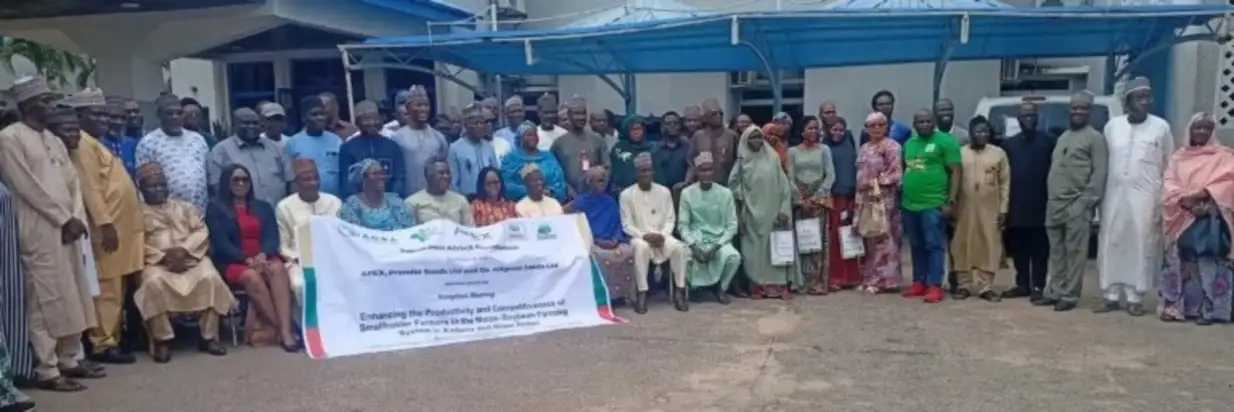The Sasakawa Africa Association (SAA) has launched a three-year agricultural project aimed at supporting 100,000 small-scale farmers to boost the productivity and competitiveness of maize and soybean value chains in Kaduna and Niger states. The initiative, titled “Enhancing the Productivity and Competitiveness of Maize and Soybean Value Chains in Niger and Kaduna States,” is funded by the Alliance for a Green Revolution in Africa (AGRA).
The project began with an inception meeting in Kaduna State that brought together partners, extension agents, farmers, and other key stakeholders from the two states. The meeting focused on strategies to increase crop productivity, strengthen market access, and improve the livelihoods of smallholder farmers through sustainable agricultural practices.
SAA Country Director, Dr. Godwin Atser, said the project targets a diverse group of beneficiaries, including 50 percent women, 40 percent youths, and five percent People With Disability (PWD). He explained that the aim is to boost food security and empower local farmers to become more competitive in the agricultural market.
“Over the years, we have increased productivity in crops like maize and soybean, but many interventions were not sustainable after project withdrawal. This time, we are adopting a market systems approach that involves the private sector so that farmers can access improved seeds, adopt better practices, and have guaranteed markets for their produce,” he said.
AGRA Programme Officer, Esther Ibrahim, noted that smallholder farmers in Nigeria continue to face significant challenges such as poor soil fertility, low-yielding seed varieties, limited access to finance, and weak supply chains. She said the project was designed to address these issues by strengthening extension and input systems, supporting certified seed multiplication and distribution, and enhancing farmers’ cooperatives for better market participation.
According to Ibrahim, the project aims to increase maize and soybean productivity by at least 35 percent while expanding the production and distribution of improved seeds. “Farmers have always been producing, but we are here to see how we can strengthen that and ensure they make more money from this venture, which is no longer just farming as usual but a business,” she said.
She added that the project is being implemented in close collaboration with the Kaduna State Ministry of Agriculture, the Kaduna Agricultural Development Agency (KADA), and other local institutions. “We are not working alone; we are working with Kaduna State. The Ministry of Agriculture is involved, KADA is involved, and we all plug in together. The states have a bigger picture of what we are doing, so whatever is the programme of Kaduna and Niger states, we work to ensure it is achieved,” she explained.
The Kaduna State Commissioner for Agriculture, Murtala Mohammed, represented by the Deputy Director in the ministry, Vasty Shamaki, said it was essential to enhance the productivity and competitiveness of Nigerian farmers to ensure sustainable benefits for both producers and consumers. He stressed that improving farmers’ output would not only raise their income but also have a positive effect on the broader economy.
Some farmers present at the event expressed optimism about the project. Muhammad Ali from Niger State said he hoped to gain knowledge on climate-smart agriculture to increase his productivity and add value to his produce. Idris Gambo, a farmer from Kaduna, said he looked forward to learning new farming techniques and sharing the knowledge with other local farmers.
The project is being co-implemented by AFEX, Premier Seeds, and Da All Green Seeds. It is expected to contribute significantly to Nigeria’s food security, agricultural growth, and sustainable rural development.

